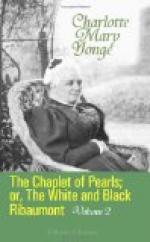Sir Marmaduke filled up the interval with a long whistle of perplexity; but, too kind not to pity the youth’s distress, he laid his hand on his shoulder, saying, ’You found out you were but a hot-blooded youth after all, but an honest one. For, as I well trust, my lass knows nought of this.’
‘How should she know, sir, what I knew not myself?’
‘Ha! ha!’ chuckled Sir Duke to himself, ’so ’twas all Dame Nan’s doing that the flame has been lighted! Ho! ho! But what is to come next is the question?’ and he eyed the French youth from head to foot with the same considering look with which he was wont to study a bullock.
‘Sir, sir,’ cried Mericour, absolutely flinging himself on his knee before him with national vehemence, ’do give me hope! Oh! I will bless you, I will—–’
‘Get up, man,’ said the knight, hastily; ’no fooling of this sort. The milkmaids will be coming. Hope—why, what sort of hope can be given you in the matter?’ he continued; ’you are a very good lad, and I like you well enough, but you are not the sort of stuff one gives one’s daughter to. Ay, ay, I know you are a great man in your own country, but what are you here?’
‘A miserable fugitive and beggar, I know that,’ said Mericour, vehemently, ’but let me have but hope, and there is nothing I will not be!’
‘Pish!’ said Sir Marmaduke.
‘Hear me,’ entreated the youth, recalled to common sense: ’you know that I have lingered at the chateau yonder, partly to study divinity and settle my mind, and partly because my friend Ribaumont begged me to await his return. I will be no longer idle; my mind is fixed. To France I cannot return, while she gives me no choice between such doctrine and practice as I saw at court, and such as the Huguenots would have imposed on me. I had already chosen England as my country before—before this wild hope had awakened in me. Here, I know my nobility counts for nothing, though, truly, sir, few names in France are prouder. But it shall be no hindrance. I will become one of your men of the robe. I have heard that they can enrich themselves and intermarry with your country noblesse.’
‘True, true,’ said Sir Marmaduke, ’there is more sense in that notion than there seemed to be in you at first. My poor brother Phil was to have been a lawyer if he had lived, but it seems to me you are a long way off from that yet! Why, our Templars be mostly Oxford scholars.’
‘So it was explained to me,’ said Mericour, ’but for some weeks past the Lady Burnet, to whose sons, as you know, I have been teaching French, has been praying me to take the charge of them at Oxford, by which means I should at least be there maintained, and perchance obtain the means for carrying on my studies at the Temple.’
‘Not ill thought of,’ said the knight; ’a fair course enough for you; but look you, you must have good luck indeed to be in a state to marry within ten or fifteen years,—very likely not then—having nothing of your own, and my wench but little, for Lucy’s portion cannot be made equal to her sisters’, her mother having been no heiress like Dame Nan. And would you have me keep the maid unwedded till she be thirty or thirty-five years old, waiting for your fortune?’




